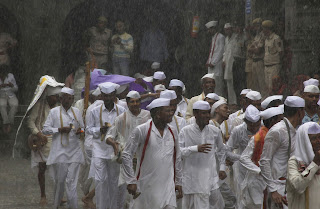I was asked to visit Alandi to meet the warkaris (people who undertake annual pilgrimage from Alandi to Pandharpur via Pune and other towns). Here's the first story
Smiling, happy faces throng the wari
A steady stream of people, the men in dhoti or vijar and sadra (white dhoti or loose pants and shirt), the women mostly in nine-yard sarees, with kids in tow, are crossing the bridge over the Indrayani river to meet their Mauli. Saint Dnyaneshwar's or Mauli's samadhi at Alandi is their destination for tonight. On Wednesday morning, alongwith the palkhi or the procession of Sant Dnyaneshwar's paduka (wooden footwear), they will set out on foot to Pune, their pit stop for two days, before crossing several villages to congregate at Pandharpur on Ekadashi.
The journey, which might seem arduous to most of us, is nothing short of worship for the warkaris – or the pilgrims. “Don't ask me how many times I have gone on wari. We don't count. Does one keep track of how many chapatis we eat for lunch? It's a family tradition. My first wari was in my mother's womb. And, I am 49-years-old. So I guess this must be my 50th wari,” says Aaba Shinde, who hails from Karmala taluka in Solapur district.
Shinde and many others are part of Vaskar Maharaj's dindi, the first dindi, which leads the palkhi of Sant Dnyaneshwar. Many of the warkaris are of farming background, illiterate, but happy to be a part of the wari in any capacity. Sarjerao Shinde, the sprightly 94-year-old warkari has been making water arrangements for the Vaskar dindi for nearly 75 years now. A grinning Sarjerao says, “I am happy to serve Mauli. I ensure that the warkaris get water for their daily needs. Everything in dindi is disciplined and we work with clock-work precision.”
When asked about water scarcity in his village, the nonagenarian replies, “There was little rain yesterday. So I sowed the seeds before leaving for Alandi. Vithu Mauli (Lord Vithoba) will take care of us.”
Another group of grape growers from Manerajuri village Sangli district is resting in the shaded courtyard. They too have left their farms in the care of their children and relatives and hope by the time they come back, rains would have given some respite.
“Our grapes are sent across the country. And, even exported. But for the last few years rains have played a truant. We hold two acres of land, so we haven't grown anything this season. If it rains in our absence, then our sons will take care. Or will have to do dobar farming,” explains Bala Jamdade, who has been participating in the wari for five years now.
Their listless looks and blank eyes are an exception in the sea of happy and smiling faces. Earlier, Rana Vaskar Maharaj said that dejected and disappointed farmers should definitely become a part of the wari. “We want more and more farmers to join the wari. If they experience the spiritual soaked atmosphere of wari, understand the true meaning of Dnyanoba and Tukoba's teachings, they won't take the decision to end their lives. They will get inspired to not give up.” says Rana Maharaj.
His words rang true, when we gathered at the Samadhi Mandir, where Sant Dnyaneshwar's palkhi was being decked up. One by one dindis marched in, playing cymbals, dancing gaily in the rains, to the chants of Gyanba-Tukaram. It was as if the Rain Gods were pleased with the devotion of the peasantry and decided to lessen their plight.

Comments
Post a Comment